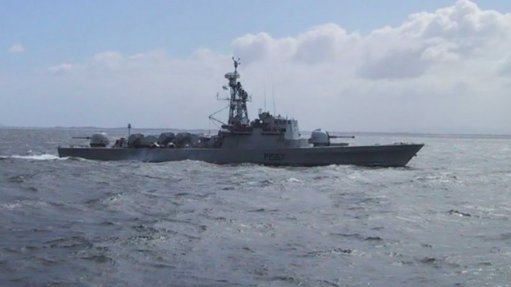
SA Navy Warrior-class strike craft, before conversion to an OPV
Photo by: SA Navy
South Africa's Chief of Naval Staff, Rear Admiral Rusty Higgs, reaffirmed on Friday the importance of Project Biro for the South African Navy (SAN) and for the country. Project Biro covers the acquisition of three Offshore Patrol Vessels (OPVs) and three Inshore Patrol Vessels. The first of these ships should be delivered in 2018.
Defence acquisition agency Armscor has been authorised to release requests for offer for these ships and it is hoped that this will be done by the middle of this year. The SAN hopes that it will be possible to build them in South Africa.
"If you do not patrol, you do not control," he stressed. "If you do not have instruments of State at sea, you don't [have] control."
"We've got four frigates [but] you need [greater] numbers," he asserted. "There is quality in quantity. We need numbers out there. For every square kilometre we have here, on terra firma, we have three at sea -- that's where our future wealth is."
Higgs highlighted the emergence of the concept of the "blue economy", that is, the economic wealth to be found in and under the sea (as well as in transit across its surface). This was first taken seriously at the 2012 United Nations (UN) Conference on Sustainable Development (better known as Rio + 20). The first Blue Economy Summit took place in Abu Dhabi in January this year. He noted that the UN Convention on the Law of the Sea provided the legal framework for the conservation and sustainable use of the oceans.
He pointed out that 95% of South Africa's international trade moves by sea. The Indian Ocean, which borders the country to the east, is the world's third largest ocean and carries 50% of the world's container traffic, 66% of the oil traffic and 33% of the bulk cargo.
Maritime insecurity comprises piracy, smuggling (including drugs, ivory and rhino horns) and human trafficking. "Maritime insecurity demonstrates little reverence for boundaries," observed Higgs. "Piracy is bad. Human trafficking is slavery." (Most of the victims are women.)
The Southern African Development Community (SADC) is working together to combat these problems. The SADC Standing Maritime Committee was set up in 1995. The SADC Maritime Strategy was adopted in 2011. This is focused on the elimination of piracy on SADC's east coast, and South Africa, Mozambique and Tanzania have taken the lead in this.
South Africa's anti-piracy mission in the northern Mozambican Channel is codenamed Operation Copper. Currently, this is being fulfilled by the frigate SAS Spioenkop. Mozambican personnel are embarked on the ship to assist with the mission.
Regarding OPVs, at the moment the SAN has to use converted strike craft (large missile boats) in this role. Three are currently in operation, with a fourth being converted. Because of their age, this is only an interim solution.
Rear Admiral Higgs was speaking at an Institute for Security Studies seminar in Pretoria.